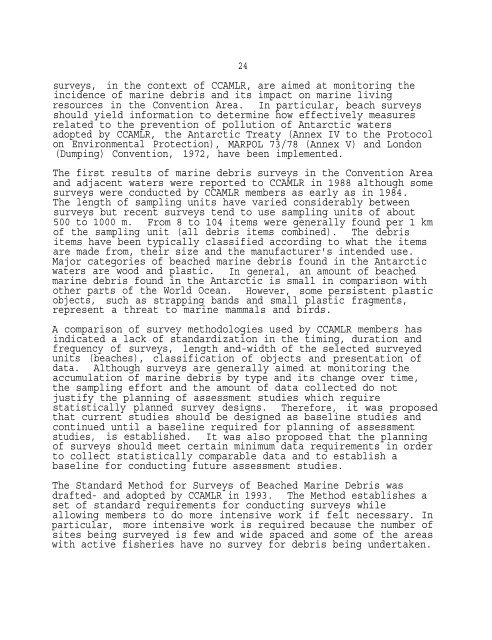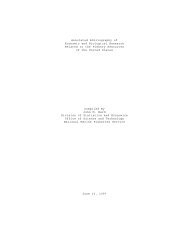Poster abstracts and manuscripts from the Third International ...
Poster abstracts and manuscripts from the Third International ...
Poster abstracts and manuscripts from the Third International ...
You also want an ePaper? Increase the reach of your titles
YUMPU automatically turns print PDFs into web optimized ePapers that Google loves.
24<br />
surveys, in <strong>the</strong> context of CCAMLR, are aimed at monitoring <strong>the</strong><br />
incidence of marine debris <strong>and</strong> its impact on marine living<br />
resources in <strong>the</strong> Convention Area. In particular, beach surveys<br />
should yield information to determine how effectively measures<br />
related to <strong>the</strong> prevention of pollution of Antarctic waters<br />
adopted by CCAMLR, <strong>the</strong> Antarctic Treaty (Annex IV to <strong>the</strong> Protocol<br />
on Environmental Protection), MARPOL 73/78 (Annex V) <strong>and</strong> London<br />
(Dumping) Convention, 1972, have been implemented.<br />
The first results of marine debris surveys in <strong>the</strong> Convention Area<br />
<strong>and</strong> adjacent waters were reported to CCAMLR in 1988 although some<br />
surveys were conducted by CCAMLR members as early as in 1984.<br />
The length of sampling units have varied considerably between<br />
surveys but recent surveys tend to use sampling units of about<br />
500 to 1000 m. From 8 to 104 items were generally found per 1 km<br />
of <strong>the</strong> sampling unit (all debris items combined). The debris<br />
items have been typically classified according to what <strong>the</strong> items<br />
are made <strong>from</strong>, <strong>the</strong>ir size <strong>and</strong> <strong>the</strong> manufacturer's intended use.<br />
Major categories of beached marine debris found in <strong>the</strong> Antarctic<br />
waters are wood <strong>and</strong> plastic. In general, an amount of beached<br />
marine debris found in <strong>the</strong> Antarctic is small in comparison with<br />
o<strong>the</strong>r parts of <strong>the</strong> World Ocean. However, some persistent plastic<br />
objects, such as strapping b<strong>and</strong>s <strong>and</strong> small plastic fragments,<br />
represent a threat to marine mammals <strong>and</strong> birds.<br />
A comparison of survey methodologies used by CCAMLR members has<br />
indicated a lack of st<strong>and</strong>ardization in <strong>the</strong> timing, duration <strong>and</strong><br />
frequency of surveys, length <strong>and</strong>-width of <strong>the</strong> selected surveyed<br />
units (beaches), classification of objects <strong>and</strong> presentation of<br />
data. Although surveys are generally aimed at monitoring <strong>the</strong><br />
accumulation of marine debris by type <strong>and</strong> its change over time,<br />
<strong>the</strong> sampling effort <strong>and</strong> <strong>the</strong> amount of data collected do not<br />
justify <strong>the</strong> planning of assessment studies which require<br />
statistically planned survey designs. Therefore, it was proposed<br />
that current studies should be designed as baseline studies <strong>and</strong><br />
continued until a baseline required for planning of assessment<br />
studies, is established. It was also proposed that <strong>the</strong> planning<br />
of surveys should meet certain minimum data requirements in order<br />
to collect statistically comparable data <strong>and</strong> to establish a<br />
baseline for conducting future assessment studies.<br />
The St<strong>and</strong>ard Method for Surveys of Beached Marine Debris was<br />
drafted- <strong>and</strong> adopted by CCAMLR in 1993. The Method establishes a<br />
set of st<strong>and</strong>ard requirements for conducting surveys while<br />
allowing members to do more intensive work if felt necessary. In<br />
particular, more intensive work is required because <strong>the</strong> number of<br />
sites being surveyed is few <strong>and</strong> wide spaced <strong>and</strong> some of <strong>the</strong> areas<br />
with active fisheries have no survey for debris being undertaken.
















